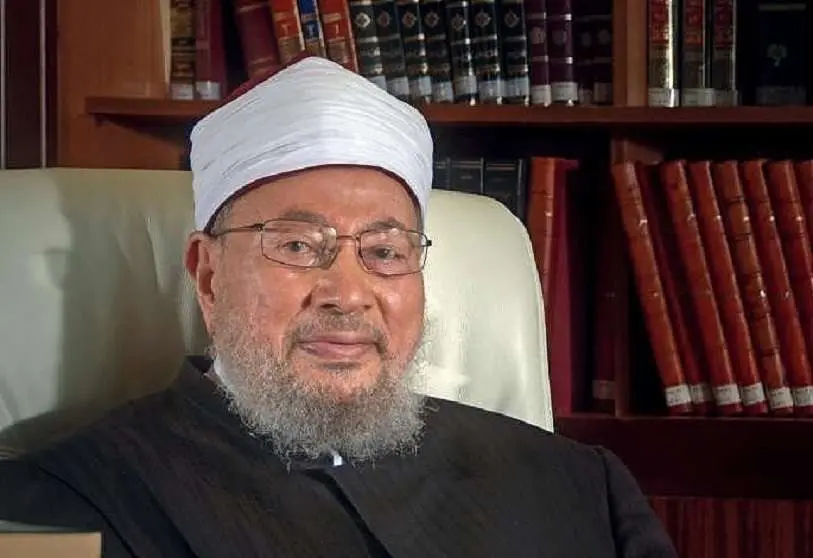Muslim Brotherhood spiritual leader Yusef al-Qaradawi dies

Yusef al-Qaradawi, an Egyptian-born cleric based in Qatar, considered one of the most influential Muslim scholars in the world of Sunni Islam and spiritual leader of the Muslim Brotherhood organisation, has died at the age of 96. This was made public on Monday, through his official Twitter account, where it was reported that "His Eminence, Imam Yusef al-Qaradawi, passed to the mercy of God, after giving his life explaining the rules of Islam and defending his nation".
انتقل إلى رحمة الله سماحة الإمام يوسف القرضاوي الذي وهب حياته مبينا لأحكام الإسلام، ومدافعا عن أمته.. نسأل الله أن يرفع درجاته في عليين، وأن يلحقه بالنبيين والصديقين والشهداء والصالحين.. وحسن أولئك رفيقا. وأن يجعل ما أصابه من مرض وأذى رفعا لدرجاته.. اللهم آمين pic.twitter.com/euoUztZeMQ
— يوسف القرضاوي (@alqaradawy) September 26, 2022
Yusef al-Qaradawi was born in Egypt's Gharbia governorate in 1926, when the country was still under the colonial control of the British crown, and during his academic years he combined Islamic religious training with anti-colonial activism. It was precisely this militancy in anti-colonialist movements, as well as his progressive links with the Muslim Brotherhood organisation, led to his arrest on more than one occasion in the 1950s.
In the late 1960s, in 1963, Qaradawi moved to Qatar, where he was appointed dean of the Faculty of Shari'a and Islamic Studies at Qatar University, after which he was granted citizenship of the small Gulf country. In addition, Qaradawi also founded the Prophet's Sunna and Biography Research Centre at the same university, which he headed until his death.

Qaradawi is, according to Al Jazeera journalist Jamal Elshayyal, "the most internationalised Muslim scholar the Islamic world has had in modern times. Probably one of the most influential, in the sense that he did not limit his teachings to a specific section of Islam. He addressed all issues, Elshayyal added, "from the permissibility of relationships, to elections and democracy, to issues of social justice", often on his television programme "Shariah and life" on the Al Jazeera channel.
In his later years, the Islamic scholar was considered the leading theorist of the Muslim Brotherhood, a group of which he was a member for most of his life, while serving as head of the International Union of Muslim Scholars (IUMS) from the union's inception in 2004 until 2018, when he was succeeded by Ahmed Raissouni.
ستكون صلاة الجنازة على سماحة الإمام يوسف القرضاوي رحمه الله غدًا الثلاثاء بمشيئة الله بعد صلاة الظهر بمسجد الإمام محمد بن عبد الوهاب، والدفن بمقابر أبو هامور، وسيكون عزاء النساء بمنزل فضيلة الشيخ، وعزاء الرجال بجوار منزله غدًا بعد صلاة المغرب.https://t.co/mxRMZn8Vpc
— يوسف القرضاوي (@alqaradawy) September 26, 2022
According to the Islamic leader's Twitter account, the funeral prayer for Qaradawi is scheduled for this Tuesday "after the noon prayer at the Mosque of Imam Muhammad bin Abdul Wahhab [in Doha]", and the burial will take place right after "at Abu Hamour [Mesaimeer] cemetery".
Qaradawi's close ties to the Muslim Brotherhood - an organisation considered terrorist in several countries in North Africa and the Middle East - led to his permanent exile from his native Egypt to Qatar in 2013. Despite moving to Doha, Qaradawi returned to Egypt in 2011, during the Arab Spring protests in the country.

In those years, the African territory witnessed the fall of Hosni Mubarak's regime and the rise to power of the Muslim Brotherhood president, Mohamed Morsi. However, the ouster of the latter, who was close to Qaradawi, and the arrival of Abdel Fattah al-Sisi - who banned the Islamist organisation - ended up driving Qaradawi into exile in Qatar, where he remained until his death, since, in 2015, and despite having left Egypt, the Cairo judicial authorities sentenced him - along with other members of the Brotherhood - to death for rebellion.

Moreover, the presence of Yusef al-Qaradawi became, in 2017, another reason for the diplomatic crisis between Saudi Arabia, the United Arab Emirates, Bahrain and Egypt with Qatar. The four Arab countries, which consider the Muslim Brotherhood a terrorist organisation, also included the Sunni cleric on the list, thus worsening the Gulf crisis.
The fatwas issued by Qaradawi have raised a lot of controversy in the Muslim world. In addition to the edict prohibiting the boycott of the State of Qatar, stating that it is forbidden by the Shari'a, there were also those prohibiting sexual relations and the authorisation of suicide attacks against Israel by the Palestinian population in the Second Intifada. An issue he later retracted. "We authorised it out of necessity, and the necessity has ended," he said.

The Muslim Brotherhood, originally founded in Egypt, has branches throughout northeast Africa and the Middle East, and played a key role during the Arab Spring uprisings in 2011. In this regard, while Qaradawi's speeches served as a counterweight to more radical Islamic ideologies, such as those espoused by Daa'esh or Al-Qaeda, they continued to support other violent militant movements in various parts of the region.









